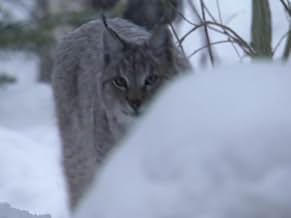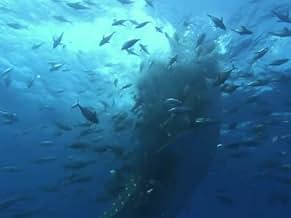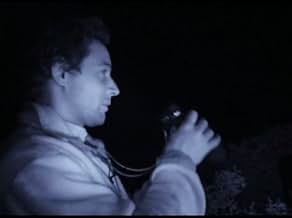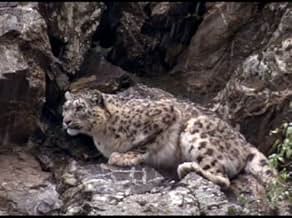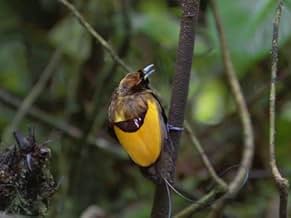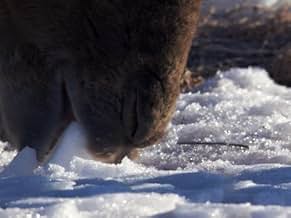Récompensée par un Emmy Award, onze épisodes, cinq ans de préparation, la série documentaire sur la nature la plus chère jamais commandée par la BBC et la première à être filmée en haute déf... Tout lireRécompensée par un Emmy Award, onze épisodes, cinq ans de préparation, la série documentaire sur la nature la plus chère jamais commandée par la BBC et la première à être filmée en haute définition.Récompensée par un Emmy Award, onze épisodes, cinq ans de préparation, la série documentaire sur la nature la plus chère jamais commandée par la BBC et la première à être filmée en haute définition.
- Récompensé par 4 Primetime Emmys
- 15 victoires et 15 nominations au total
Parcourir les épisodes
Résumé
Reviewers say 'Planet Earth' is acclaimed for its stunning cinematography and David Attenborough's engaging narration. The series is celebrated for its educational value and evocative portrayal of Earth's ecosystems. However, some critics note script gaps and insufficient scientific depth. Concerns exist about the focus on predation and survival in animal behavior portrayals. A few reviewers are disappointed with the Blu-ray release for omitting extras. Despite these issues, 'Planet Earth' is widely regarded as a significant achievement in nature documentaries.
Avis à la une
10ultimorn
I have seen many nature documentaries in my life and none have left me in such amazement of our planet as this series. The sheer work that went into its making alone is impressive. The shots that are captured on film are like none ever seen and remind us of both the power of mother nature and her fragility. I highly recommend this series to people of all ages as there is something for everyone. If you do watch any of the episodes, do watch "Pole to Pole". It is a great all-encompassing view of many animals and their habitats. David Attenborough does a great job as narrator. If you enjoy this series also check out "The Blue Planet", a series by the BBC on oceans (also narrated by Attenborough).
Planet Earth is a worthy documentary series that looks not just at the animals and plants in remote areas, but at the ever-changing ecosystems that look prone to collapse in the near future. This is the sort of programme that the BBC excels at and makes better than anyone else.
The camera-work is fantastic and the sections at the end of each programme where they look at how certain parts were filmed is interesting as you see the dedication of the crew who go out to these desolate spots for months to film sections that will last only a couple of minutes on screen. Much of the wildlife has barely been filmed and some such as the wonderfully agile Wild Amur leopard have probably only been seen by very few living people in the flesh.
It is narrated by David Attenborough who has the perfect voice for wildlife documentaries and his presence is almost a guarantee of quality in itself. His record speaks for itself.
Some of the sequences shown are very brave, most notably the struggles of the polar bear to find food on the ever-decreasing Arctic ice. Too many nature documentaries succumb to "niceness" and show only cute animals looking sweet. To understand how Man is changing the planet it is crucial to show how wasting energy may be affecting wildlife in distant lands (or seas). Sadly it is also important as it seems all too likely that much of the footage will become museum property in the near future, showing subsequent generations the marvellous diversity of life Earth used to enjoy.
Overall it has some good educational value as it can be enjoyed both by young children and was recommended by my tutors during a conservation module of my degree.
The camera-work is fantastic and the sections at the end of each programme where they look at how certain parts were filmed is interesting as you see the dedication of the crew who go out to these desolate spots for months to film sections that will last only a couple of minutes on screen. Much of the wildlife has barely been filmed and some such as the wonderfully agile Wild Amur leopard have probably only been seen by very few living people in the flesh.
It is narrated by David Attenborough who has the perfect voice for wildlife documentaries and his presence is almost a guarantee of quality in itself. His record speaks for itself.
Some of the sequences shown are very brave, most notably the struggles of the polar bear to find food on the ever-decreasing Arctic ice. Too many nature documentaries succumb to "niceness" and show only cute animals looking sweet. To understand how Man is changing the planet it is crucial to show how wasting energy may be affecting wildlife in distant lands (or seas). Sadly it is also important as it seems all too likely that much of the footage will become museum property in the near future, showing subsequent generations the marvellous diversity of life Earth used to enjoy.
Overall it has some good educational value as it can be enjoyed both by young children and was recommended by my tutors during a conservation module of my degree.
This is a beautifully shot series looking at nature in all it's natural wonder, showcasing a breathtaking diversity of life from the poles to the deserts.
With the spectre of global warming rapidly looming I wonder just how much of these wonderful ecosystems are going to survive. I just hope that in 100 years time people will not watch 'Planet Earth' with the same curiosity that I have when look at etchings of the Dodo from old books.
TV like 'Planet Earth' has made me think a lot more about the natural world that surrounds me and the impact I am having on it. We can't sit back and let this disappear. It's for all future generations, not just this one.
With the spectre of global warming rapidly looming I wonder just how much of these wonderful ecosystems are going to survive. I just hope that in 100 years time people will not watch 'Planet Earth' with the same curiosity that I have when look at etchings of the Dodo from old books.
TV like 'Planet Earth' has made me think a lot more about the natural world that surrounds me and the impact I am having on it. We can't sit back and let this disappear. It's for all future generations, not just this one.
Thankfully, I caught a couple of these episodes on American television, which led me to this 11-part series on Blu-Ray DVDs and over five hours of outstanding entertaining and education. Looking back, I still shake my head in amazement at the things I saw on these discs.
Obviously, the incredible photography and sharpness/color (please see this on high-def, if you can) is the first thing that captures the viewer's eye, but as the series went on I appreciated the objectivity in here ("aw, cute" shots mixed in with the brutality of existence) and the lack of environmental propaganda, which one usually gets in boatloads in these "nature" films. Here, the writers and narrator David Attenborough just present the world as it is. Only at the very end do you get a short environmental message. It isn't needed: the beauty of this earth says it all, and the writers were smart enough to figure that out during this series.
After viewing 11 discs, you come to the obvious conclusions that in the Earth's world of animals, birds and fish come only a few objectives: where to find food, water, a mate, and escape being devoured by a predator. That's it, except for pets or zoo animals. On land or in water, it's simply a matter of survival, as this BBC series shows us.
What makes this so special is that, thanks to incredible work by cameramen, we are privy to many extraordinary sights we would never see, if left on our own, and never imagined existed on this planet. Much of this series is simply mind-boggling to view, especially all the overhead shots, which were stunning.
There are too many positive adjectives I could use to even begin, in recommending you watch this. Just give it a try - any of the 11 segments - and see if you don't want to then watch all of them.
Obviously, the incredible photography and sharpness/color (please see this on high-def, if you can) is the first thing that captures the viewer's eye, but as the series went on I appreciated the objectivity in here ("aw, cute" shots mixed in with the brutality of existence) and the lack of environmental propaganda, which one usually gets in boatloads in these "nature" films. Here, the writers and narrator David Attenborough just present the world as it is. Only at the very end do you get a short environmental message. It isn't needed: the beauty of this earth says it all, and the writers were smart enough to figure that out during this series.
After viewing 11 discs, you come to the obvious conclusions that in the Earth's world of animals, birds and fish come only a few objectives: where to find food, water, a mate, and escape being devoured by a predator. That's it, except for pets or zoo animals. On land or in water, it's simply a matter of survival, as this BBC series shows us.
What makes this so special is that, thanks to incredible work by cameramen, we are privy to many extraordinary sights we would never see, if left on our own, and never imagined existed on this planet. Much of this series is simply mind-boggling to view, especially all the overhead shots, which were stunning.
There are too many positive adjectives I could use to even begin, in recommending you watch this. Just give it a try - any of the 11 segments - and see if you don't want to then watch all of them.
10jim-1409
The camera work is truly breathtaking. Such amazing wonders captured on film, areas of the planet unspoiled by human domination.
DIfferences in culture seem to play a big part in the reviews of this documentary; some choosing to review based on "Disney" like criteria. Criticisms for the apparent emphasis on the viscous and dark side of animals and nature.
I guess some people would prefer a nice talking lion and perhaps an Elton john song thrown in.
Cutting slack on the sarcasm and returning to the point; This is a must watch documentary for anybody with a sincere appreciation for life and the planet in which we live.
An achievement for all those involved in the making to be proud of.
DIfferences in culture seem to play a big part in the reviews of this documentary; some choosing to review based on "Disney" like criteria. Criticisms for the apparent emphasis on the viscous and dark side of animals and nature.
I guess some people would prefer a nice talking lion and perhaps an Elton john song thrown in.
Cutting slack on the sarcasm and returning to the point; This is a must watch documentary for anybody with a sincere appreciation for life and the planet in which we live.
An achievement for all those involved in the making to be proud of.
Le saviez-vous
- AnecdotesFor the air shots, a special airborne camera was used with a 400mm lens that was able to zoom into single animals from a kilometer away without disturbing them.
- Versions alternativesSigourney Weaver replaces David Attenborough for the narration of the US version.
- ConnexionsEdited into Un jour sur terre (2007)
Meilleurs choix
Connectez-vous pour évaluer et suivre la liste de favoris afin de recevoir des recommandations personnalisées
- How many seasons does Planet Earth have?Alimenté par Alexa
Détails
- Date de sortie
- Pays d’origine
- Sites officiels
- Langue
- Aussi connu sous le nom de
- Planet Earth
- Lieux de tournage
- Sociétés de production
- Voir plus de crédits d'entreprise sur IMDbPro
- Durée50 minutes
- Couleur
- Rapport de forme
- 1.78 : 1
Contribuer à cette page
Suggérer une modification ou ajouter du contenu manquant

Lacune principale
What is the Canadian French language plot outline for Planète Terre (2006)?
Répondre






